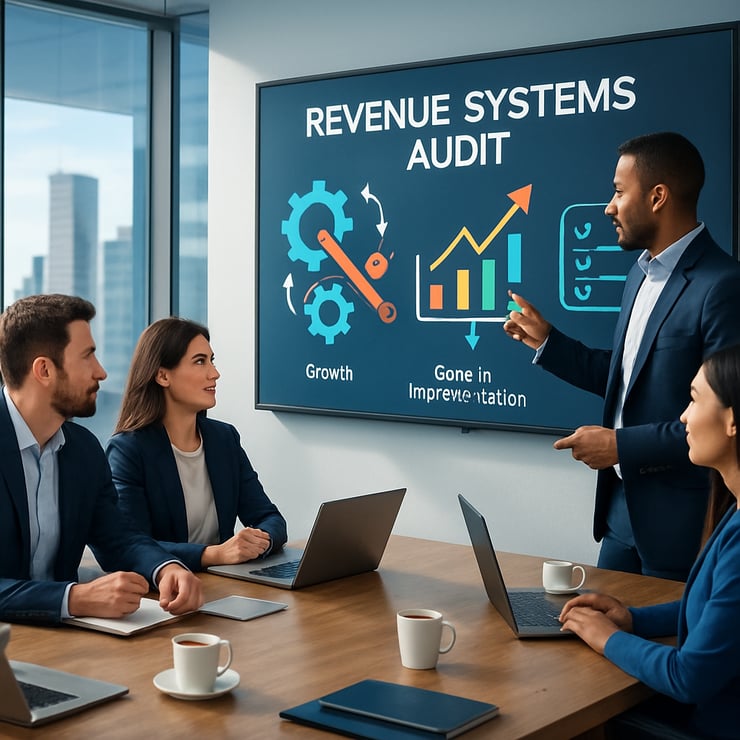
Common Challenges Faced by Established Service Businesses
Established service businesses, particularly those generating $10M+ in revenue, often find themselves grappling with a unique set of challenges. Among the most pervasive issues are the proliferation of disconnected tools, manual processes that fail at scale, and a lack of unified visibility into revenue drivers.
Many businesses rely on an array of disparate software solutions—15 or more in some cases—that create data silos. This fragmentation obstructs seamless data flow and hinders comprehensive insights, making it difficult to pinpoint what's driving revenue and where improvements are needed. Additionally, manual processes, which might work well in a smaller setup, often crumble under the pressure of scaling. These processes are not only time-consuming but also prone to human error, leading to inefficiencies and lost opportunities.
A unified view into revenue operations is another significant challenge. Without it, businesses operate in the dark, relying on gut feelings rather than data-driven decisions. This lack of visibility can perpetuate inefficiencies and prevent the identification of growth opportunities.
The Importance of a Comprehensive Revenue Systems Audit
A Revenue Systems Audit is critical for transforming these challenges into opportunities. Unlike general business consulting, a Revenue Systems Audit focuses specifically on revenue operations, providing a deep dive into marketing, sales, CRM, and revenue operations.
This comprehensive review helps diagnose existing inefficiencies and offers a full go-to-market (GTM) system blueprint tailored for service businesses. By integrating all tools and processes into a cohesive system, the audit aims to eliminate data silos and streamline operations. The transformation is not just theoretical; it is actionable, with clear steps laid out to turn a $10M+ service business into a scalable, sale-ready revenue engine.
Moreover, the audit provides a systematic approach to revenue generation, replacing unreliable gut-feel selling with data-driven processes that can be replicated across markets. This ensures that your top salesperson's "magic" is no longer an isolated skill but a replicable system accessible to the entire team.
Turning Gut-Feel Selling into Data-Driven Processes
One of the significant transformations brought about by a Revenue Systems Audit is the shift from gut-feel selling to data-driven processes. Gut-feel selling, while sometimes effective, is inherently unreliable and difficult to scale.
A Revenue Systems Audit replaces this approach with structured, data-driven processes. By leveraging data analytics, the audit identifies the most effective sales strategies and standardizes them. This makes it easier for sales teams to replicate successful tactics, ensuring consistent performance across different markets and sales teams.
This transformation also involves implementing customer relationship management (CRM) systems that provide real-time insights into customer behaviors and preferences. These insights enable sales teams to tailor their approaches, increasing the likelihood of closing deals and enhancing customer satisfaction. The result is a more efficient, effective, and scalable sales strategy that drives sustained revenue growth.
Identifying and Leveraging Hidden Growth Opportunities
One of the standout benefits of a Revenue Systems Audit is its ability to uncover hidden growth opportunities. These opportunities are often overlooked due to the fragmented nature of existing systems and processes.
The audit meticulously examines all aspects of revenue operations to identify areas where improvements can be made. For instance, it might uncover lead leakage points where potential customers are falling out of the sales funnel, or it might identify pricing optimization gaps that, if addressed, could add 20-30% to the bottom line.
By identifying these hidden levers, the audit provides actionable insights that can significantly boost revenue. Whether it's optimizing pricing strategies, improving lead conversion rates, or enhancing customer retention, these insights offer a clear path to growth that competitors may not have discovered.
Implementing Quick Wins for Immediate Revenue Improvement
While the long-term benefits of a Revenue Systems Audit are substantial, it also delivers quick wins that provide immediate revenue improvements. Within 30-60 days, businesses can start seeing tangible results from the audit.
These quick wins often involve low-hanging fruit—simple yet impactful changes that can be implemented swiftly. For example, streamlining the sales process, automating manual tasks, or addressing minor inefficiencies can lead to immediate gains. These quick wins not only boost revenue but also build momentum and confidence among the team, paving the way for more extensive long-term changes.
The audit provides a clear implementation plan for these quick wins, ensuring that businesses can start seeing results without delay. This focus on immediate improvements makes the audit a valuable investment, delivering both short-term gains and long-term growth.
Building Long-Term Systems for Sustainable Growth
The ultimate goal of a Revenue Systems Audit is to build long-term systems that support sustainable growth. While quick wins are essential, they are just the beginning. The audit lays the foundation for systems that scale with the business, ensuring ongoing success.
These long-term systems integrate all aspects of revenue operations, from marketing and sales to CRM and revenue management. By creating a cohesive and streamlined operation, businesses can scale more efficiently, reducing the risks and inefficiencies associated with growth.
Moreover, these systems are designed to be adaptable, allowing businesses to respond to changing market conditions and new opportunities. This adaptability ensures that the business remains competitive and continues to grow, regardless of external factors.
In conclusion, a Revenue Systems Audit is a powerful tool for transforming established $10M+ service businesses into scalable revenue engines. By addressing common challenges, uncovering hidden growth opportunities, and providing a clear implementation plan, the audit delivers both immediate and long-term benefits. It replaces gut-feel selling with data-driven processes, ensuring consistent and sustainable revenue growth. For businesses looking to scale and succeed, a Revenue Systems Audit is an invaluable investment.


